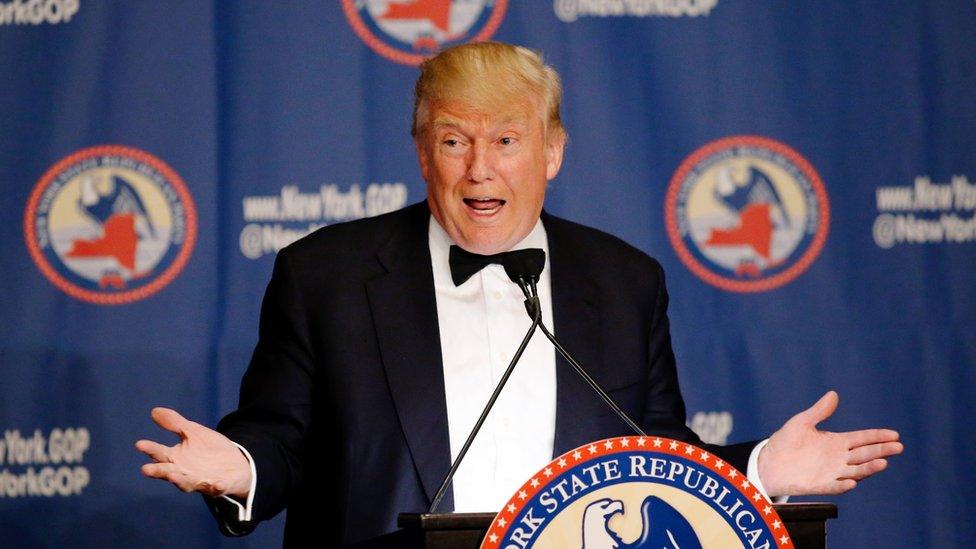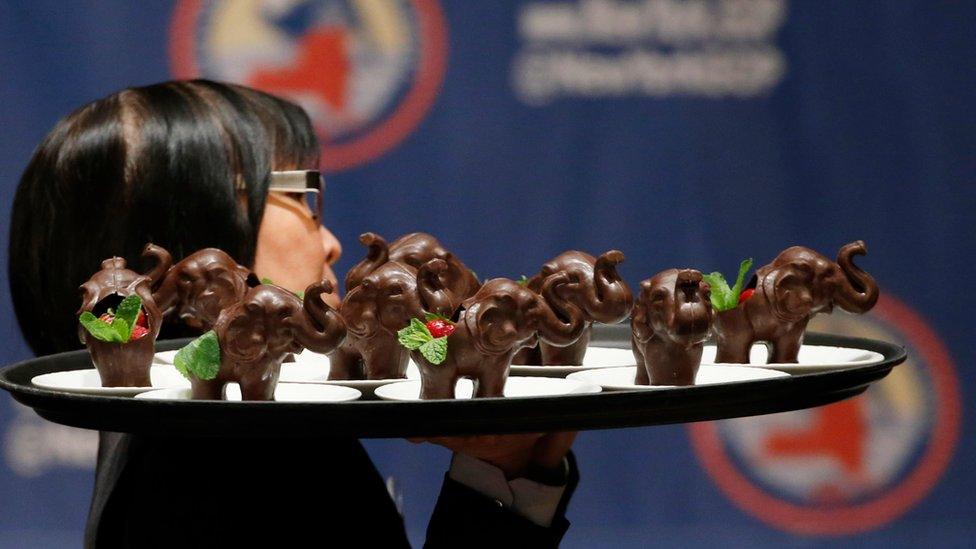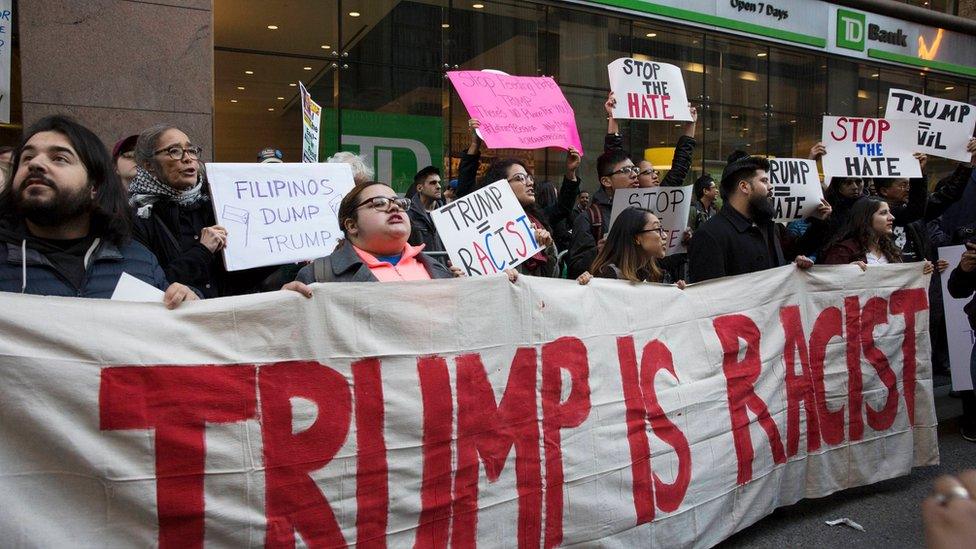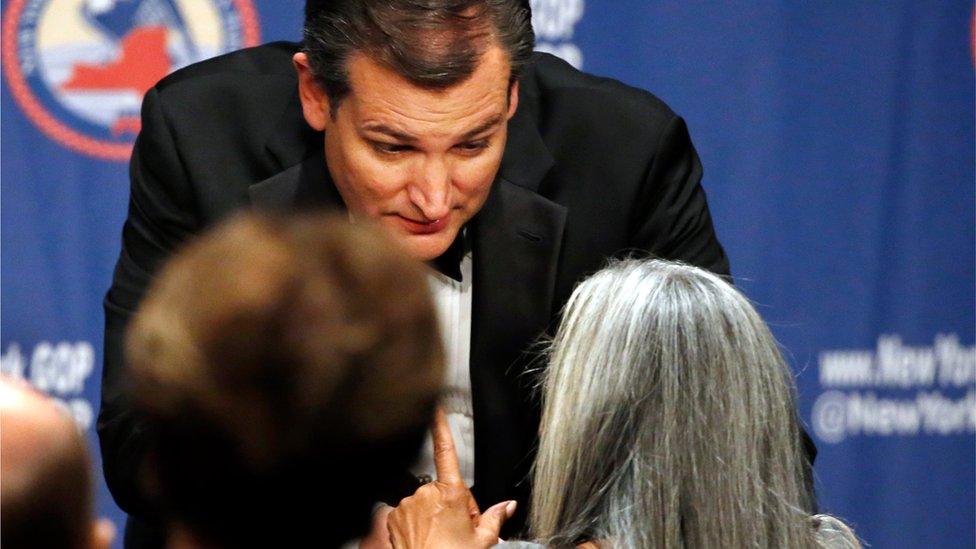Is Trump's one-night truce in Republican war too late?
- Published

After weeks of feuding with the party, Mr Trump warmed up to the establishment at an annual gala
For one night, at least, there was a truce.
Donald Trump has spent the past few weeks clashing with the Republican establishment over the party's nomination process and what he considers its unfair treatment of his candidacy. At a Republican gala in Manhattan on Thursday, however, he took the opportunity to show that he could be a kinder, gentler candidate.
After a warm introduction by New York Republican Party chair Edward Cox - son-in-law of former President Richard Nixon - Mr Trump spent 20-plus minutes affably regaling the crowd with tales of his real-estate prowess, noting that he built the hotel hosting the evening's black-tie event.
On a night when his two opponents - and keynote speaker New Mexico Governor Susana Martinez - had to deliver their remarks above the din of dinner-time chatter, Mr Trump received an enthusiastic welcome. One woman stood for the entire speech, waving a napkin and cheering. Another shouted back at the candidate approvingly.
It was enough to raise suspicions that the New York billionaire may have made an extra effort to ensure that the audience, a record-setting crowd for the annual event, was tilted in his favour. At one point Mr Trump acknowledged his "construction friends" in tables toward the back of the ballroom.
"This was my first political event in about 20 years," said Matthew Kaufman, a lawyer from Mineola, New York. "I believe Trump has the right plan to reinvigorate business and bring jobs back to this country, and to make people proud to be American again."
Another Long Islander, Eugene Dunn, lavished praise on the candidate - and his bestselling book.

The tension over the nomination wasn't the only elephant in the room
"It's amazing the guy can make a speech the way he does without a Tele-prompter," the energy-sector employee, who said he was given a ticket to the $1,000-a-head event, observed. "It was his life story, basically right out of the Art of the Deal, one of the greatest books ever."
Phil Palmesano, a state assemblyman from central New York who supports Ohio Governor John Kasich's presidential bid, said Mr Trump "certainly resonated" with the gala crowd. He worried that if the intra-party fighting that's typified the race over the past few weeks doesn't come to an end soon, however, Republicans will face general-election turmoil.
"Whatever happens with the election process, we have to focus on the big picture, which is the vision and future of our country," he said. "We all have to come together and sell a message that the people are going to support."
While Mr Trump may have received a friendly home-field reception from this particular slice of the Republican Party, he has his work cut out for him if he wants to close the deal on the presidential nomination. The easiest way for him to achieve this goal is to secure 1,237 bound delegates by the last batch of primaries in early June and stride into the hall of the Republican National Convention in July as a triumphant conqueror.
To do that, however, he would have to win roughly 60% of the remaining delegates, starting with a big victory on Tuesday in New York.
If he can't pull it off - and it looks far from a sure thing - he could cobble together a convention-floor majority by cajoling currently unbound delegates, of which there will be several hundred, to rally to his side. The closer he is to 1,237 coming in, the more likely it is he could pull this off.
According to one Republican Party official, external, anything over the 1,100 mark should do it. Between 1,000 and 1,100 is a gray area.
Post a number less than that, however, and second-place Ted Cruz's efforts to sequester as many loyalists as possible among the delegate ranks - even if they're initially bound to Mr Trump - could tip the balance to the Texan. Or it could end up a protracted, chaotic mess, with someone else - third-place Kasich or a mystery candidate - prevailing after multiple nomination votes.

Some of Trump's policy positions have made Republican party leaders uneasy
"I believe the first ballot will be the highest vote total Donald Trump receives," Mr Cruz said in a recent speech, external. "And on a subsequent ballot, we're going to win the nomination and earn the majority."
But did it really have to be this way for the New York real estate mogul? His Thursday night performance in Manhattan was warm and charming - and just last month, as he was steamrolling his opposition across the South, it looked like this would be Mr Trump's new visage. The candidate had won the Florida primary, with its trove of delegates, and in his victory speech he struck a measured, inclusive tone.
"At the right time, I will be so presidential that you'll call me and you'll say, 'Donald, you have to stop that"," he told conservative radio host Sean Hannity, external just days earlier. It appeared that time had arrived.
Indeed, some in the Republican Party seemed to be coming to terms with the prospects of Mr Trump as the Republican standard-bearer. On 21 March, Mr Trump travelled to the US Capitol, where he met with friendly lawmakers and a party establishment he had spent months mocking.
"I think he has the clearest path to the nomination, and it only makes sense that he unify the party and get the people behind him," said Congressman Scott DesJarlais, external, who took part in the meetings.
But a series of things appeared to harden the #NeverTrump movement's resolve.:
ongoing outbreaks of violence at Trump rallies seemingly condoned by the candidate himself
criminal charges - now dropped - against campaign manager Corey Lewandowski stemming from an incident with a female reporter at a Florida rally
a series of questionable Twitter attacks on Mr Cruz's wife,
a renewed feud with Fox News presenter Megyn Kelly
conflicting responses when asked about his views on abortion and public approval numbers that sank from bad to terrible - particularly among female voters -
What followed was a wave of support for Mr Cruz - including endorsements from former candidates Jeb Bush and Wisconsin Governor Scott Walker - a daunting defeat in the Wisconsin primary, a shutout in the delegate-selection conventions in Colorado and a steady drumbeat of reports that Mr Cruz was eating into Mr Trump's delegate lead even in states that the New Yorker had "won" in earlier primaries and caucuses.

Republican leaders have recently rallied around Mr Cruz in hopes of thwarting Mr Trump
Some of the New Yorker's ardent supporters were left with nagging concerns.
"I'm a little testy with our man right now. Our candidate is mental," said conservative commentator Ann Coulter, external. "It's like constantly having to bail out your 16-year-old son from prison."
While Mr Trump is still promising he will rally the party around him and "be so presidential you won't believe it", he's once again directing his fire at the establishment and a party nomination process he calls "rigged".
"Give me a break," Mr Trump said at a rally in Albany, New York, earlier this week. "It's disgusting. It's a sick system."
The front-runner's comments prompted a rebuke from head of the Republican National Committee.
"Nomination process known for a year and beyond," Reince Priebus tweeted, external. "It's the responsibility of the campaigns to understand it. Complaints now? Give us all a break."
Trump didn't back down from his criticisms, however. In a television interview on Tuesday he repeated his condemnations. "This is not democracy at its finest," he said.
On Thursday night, though, Mr Trump was all sunshine and flowers. He boasted that he had won millions of votes and hundreds of more delegates than Mr Cruz. And he had nary a harsh word for the Republican Party officials he had earlier accused of conspiring against him.
But will it last? And if it does - even with a big win in New York on Tuesday - is it now too late to make a difference?